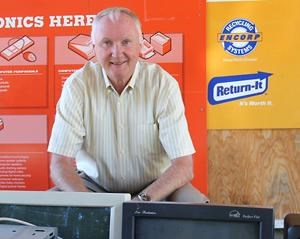Changes to BC’s recycling regulations mean local governments will be responsible for much less solid waste in the future. In three years, the province will have implemented a program that makes producers of packaging and printed papers responsible for those products.
Neil Hastie, president and chief executive officer of Encorp Pacific, explained the changes during a presentation at the August 25 Powell River Regional District board meeting. Encorp Pacific is a stewardship program and industry-led agency that is responsible for empty beverage containers and managing the electronics recycling program.
In May 2011, the provincial government amended the Recycling Regulation to include packaging and printed paper as a product category. By May 2014 producers of packaging and printed paper are required to implement a stewardship program for their collection.
“The industry has been given three years to organize the transition from local-government-operated recycling programs for packaging and printed papers,” Hastie said. “The industry is responsible for 100 per cent of the costs.”
It is a good development for the province, Hastie added, and for local governments. “The definition of packaging in British Columbia law is a very broad definition,” he said. “It covers everything.”
Starting in October 2011, consumers will be able to drop off small appliances, such as microwaves, toasters, kettles and hair dryers at Encorp Pacific depots. Next summer, large appliances will be in the stewardship program, which includes everything that has a cord or a battery. “You imagine in your home, anything with a cord, anything that takes electricity, will be part of a industry-operated stewardship program, where residents can take back free of charge those items, whether they’re big appliances or small appliances,” Hastie said.
Stewardship programs are part of the green economy, as they divert material from landfills and ease some of the waste management burden for communities and taxpayers. The program keeps toxic material out of the environment and captures recyclables. For example, aluminum becomes a new aluminum can and plastic is used to make plastic film or plastic wrap. Glass, used for wine and spirit bottles, goes back into making wine bottles or insulation for residential construction.
“Everything we collect is put back into the resource recovery economy, which is a good thing,” said Hastie. “It generates employment and good economic activity.”
Encorp licences 172 Return-It sites throughout the province, including one in Powell River. Sunset Coast Bottle Depot is owned and operated by Hyundai Choi and his wife, Kyungson. It employs five people.
In 2010, 425,000 kilograms of beverage containers were collected in Powell River, which is around eight million empty containers or 230 containers per person. That is slightly more than the provincial average of 227.
Encorp also collected 90,000 kilograms of electronics, or 3.4 kilograms per person. That is more than the provincial average of 3.2 kilograms and was a 30 per cent increase over the previous year. “This is quite a successful program,” Hastie said. “Traditionally I find that in small cities that number is lower. It tends to be pretty big in cities. Yours is unique in that respect. There’s obviously a spirit here behind recycling, particularly for electronics, and that’s really gratifying from our point of view.”
Recycling also has a climate change benefit, Hastie pointed out. “By using recycled materials, we avoid greenhouse gases,” he said.
In Powell River, the recycling done by residents avoided 600 metric tones of carbon dioxide, the equivalent of taking 200 cars off the road or enough energy for 300 homes.



